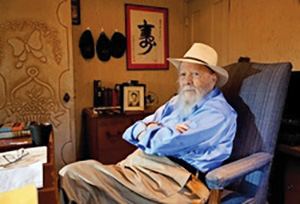
Pulitzer Prize-winning author Herman Wouk died on May 17, just 10 days before his 104th birthday. His literary agent, Amy Rennert, said he passed away in his sleep at his home in Palm Springs, California, where he settled after living for many years in Washington, D.C.
Wouk’s two dozen works include some of the most important books cataloging the 20th century Jewish and American experience, including “The Winds of War,” “War and Remembrance,” “Marjorie Morningstar” and “The Caine Mutiny.” Also among his most influential and insightful works is the widely read and cited book “This Is My God,” a layman’s explanation of Judaism written for Jewish and non-Jewish audiences. Through many of his works, he articulates Orthodox values and culture to a wider American audience while also providing distinguished service to the American project and the freedoms it represents.
Born in The Bronx, New York, Wouk was educated in Judaism by his grandfather, who taught him Talmud and other subjects. His family had immigrated from Russia. He received an A.B. from Columbia University.
Wouk worked first as a radio scriptwriter, working with Fred Allen, then in 1941 worked for the U.S. government on radio spots selling war bonds. He then joined the United States Navy and served in the Pacific Theater, an experience he later characterized as educational: “I learned about machinery, I learned how men behaved under pressure and I learned about Americans.” His first ship was the USS Zane, then he was second-in-command on the Southard. He started his writing career onboard, working on a novel during his off-duty hours. In 1945, Wouk married Betty Sarah Brown, who died in 2011. They had three sons—Joseph, Nathaniel and Abraham, their oldest, who tragically drowned in 1951.
Wouk became a full time writer in 1946, and published his debut novel, “Aurora Dawn,” in 1947. In 1952, “The Caine Mutiny” received the Pulitzer Prize. In 1998, he received the Guardian of Zion Award.
“He really was the Jackie Robinson of Jewish-American fiction,” Jonathan Karp, president and publisher of Simon & Schuster, and editor of Wouk’s final book, “Sailor and Fiddler,” published in 2015, told National Public Radio. “He was on the cover of Time magazine for “Marjorie Morningstar,” and he popularized a lot of themes that other writers— like [Saul] Bellow and [Philip] Roth and [Bernard] Malamud—would deal with in their novels.”
In “War and Remembrance,” Wouk wrote about the Holocaust: “The accounts I have heard of what the Germans are doing in camps like [Auschwitz] exceed all human experience. Words break down as a means of describing them. … The Thucydides who will tell this story so that the world can picture, believe and remember may not be born for centuries. Or if he lives now, I am not he.”
His 1993 novel, “The Hope,” is about crucial moments in the state of Israel’s history between 1948 and 1967.
As an active leader in the Jewish community, Wouk met the Rebbe—Rabbi Menachem M. Schneerson, z”tl—numerous times. In honor of the Rebbe’s 70th birthday, Wouk brought the Rebbe personal greetings from President Richard Nixon. At a subsequent gathering at Chabad House in St. Paul, Minnesota, he referred to the Rebbe as the “most optimistic American Jew,” quoting the Rebbe’s advice that one cannot tell American Jews to do anything, but they can be taught to do everything.”
Dr. Wouk—who received an honorary doctorate from Yeshiva University in 1954—was a YU Guardian who served as a visiting professor, teaching English rhetoric at Yeshiva College from 1952 to 1957. His teaching, writing and storytelling continue to inspire generations of students, faculty and alumni.
He and his family were long-time supporters of Yeshiva University and undertook an effort to establish the Abraham Wouk Family Chair in English Literature and Classics. His late mother, Esther Wouk, and his late sister, Irene Green, were active leaders in the Yeshiva University Women’s Organization. His late brother, Dr. Victor Wouk, was a renowned scientist and long-time friend of Yeshiva University and a member of the board of trustees of the Marsha Stern Talmudical Academy/Yeshiva University High School for Boys.
Even as he worked as a sought-after producer on Broadway, he proudly maintained his faith and tradition, taking off every Shabbat to pray, celebrate and spend time with his family. He was also a resident of Georgetown, in Washington, D.C., for many years, where he davened at Congregation Kesher Israel.
In recent decades, he was a beloved and familiar figure at Chabad of Palm Springs, California, where he worshipped regularly, according to Chabad.org.









